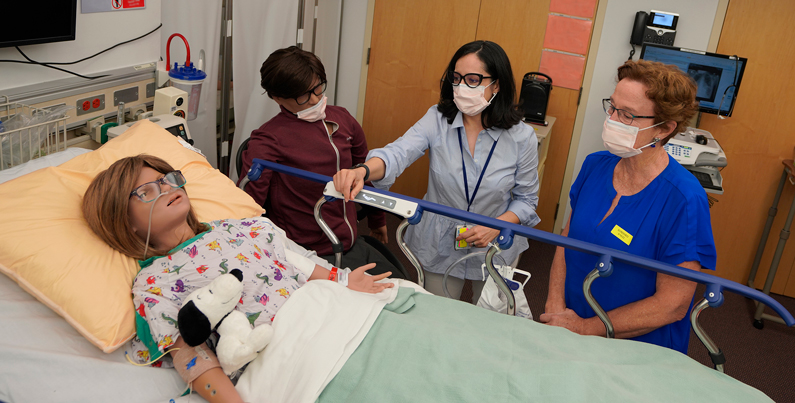
The NIH Clinical Center held its Healthcare Simulation Week from Sept. 12 through 16. Hosted by the hospital's Healthcare Simulation Program, the week showcased how state-of-the-art simulation can support training and education for clinical and administrative professionals.
Activities during the week highlighted resources, training aids and equipment available to healthcare professionals that can assist in improving team communication, patient safety and clinical outcomes.
The week also featured speakers including retired Navy Capt. Dr. Joseph Lopreiato, an associate dean for Simulation Education at the Uniformed Services University of the Health Sciences and former president of the Society for Simulation in Healthcare. Lopreiato spoke on the evidence supporting simulation-based education.
Additional presenters included Dr. Nitin Seam, associate chief of Critical Care Medicine, who spoke on simulation-based education for High-Risk Low-Volume care, and Dr. Mabel Gomez-Mejia, medical simulation facilitator, who presented on the NIH Clinical Center's simulation program activities and initiatives.
The week offered NIH and Clinical Center staff the opportunity to explore a scenario in the simulation suite. Employees from different disciplines and experience-levels participated in the activity.
"Many nurse residents are familiar with simulation, as a considerable amount of their clinical practicum hours in their BSN/MSN programs were done via simulation (in the sim lab and virtually) due to the impact of the pandemic on practicum site availability. Participating in this week's activity sets expectations high of what to expect when attending professional development offerings at the Clinical Center, and I look forward to exploring future partnerships with the CC Simulation Program to optimize learning outcomes," said Melanie Mudd, Clinical Research Nursing Residency program coordinator.
"This is only the beginning," said Ronald W. Gillis, healthcare simulation tech with the NIH Clinical Center Nursing Department. "We envision continued interest in the simulation program and its need to expand while leading the way for a higher degree of patient care within the NIH Clinical Center."
By creating a realistic healthcare environment, Healthcare Simulation Week provided learning tools that taught new skills, refreshed old ones and improved the delivery of safe and effective patient care.
For more information on the Clinical Center's Healthcare simulation program, visit https://intranet.cc.nih.gov/sim_program/index [Staff Only].
- Yvonne Hylton

